|
Getting your Trinity Audio player ready...
|
The Republic of Uzbekistan is making advances in becoming more open to the digital currency industry. Uzbek President Shavkat Mirziyoyev has issued a decree for restructuring the regulatory framework of the country’s digital currency industry.
The decree orders that the National Agency for Project Management (NAPM) be restructured into a new entity, which will be called the National Agency for Perspective Projects (NAPP) and will have broad powers to regulate the digital currency market and firms in the industry.
The NAPM is a presidential agency that has been in the thick of things related to digital currency regulations. Before, the agency has advocated for the central Asian country to adopt a “special crypto regulation regime” and for digital currency trading restrictions on residents to be lifted.
Under the restructuring directive, the NAPP is now tasked with developing and adopting a unified state policy for digital assets. This includes policies that will ensure consumer protection and anti-money laundering and terrorism funding safeguards.
All digital currency firms, including exchanges and block reward miners in the country, will answer to the agency. These firms will be required to pay several fees to the agency, including a 7.5% income tax for their employees.
“Participants of the special regime have to pay mandatory deductions to all types of taxes and state trust funds, as well as customs payments for equipment, technological documentation, software […] imported for their own needs, not produced in the Republic of Uzbekistan […]” the decree read.
Reuters reports that the decree has also legalized digital currency block reward mining using solar power in a similar bold step. The president stated that block reward miners that do not power their farms with solar would have to pay double the regular price for electricity from the country’s grid.
A breath of fresh air for Uzbek’s digital currency industry?
The initiative is among several others that the Tashkent government has made over the past few years. After assuming office in 2016, Mirziyoyev legalized digital currency trading in 2018 but with a few restrictions.
Digital currency exchanges that want to offer their services in the country must be registered locally. Meanwhile, local firms were also barred from launching digital currency exchanges. The country’s citizens are not allowed to make local payments in digital currencies.
With the signing of the new decree, the market hopes that the door will be opened for the expansion of the industry in the country.
Don’t miss out the first ever BSV Global Blockchain Convention taking place at the Grand Hyatt in Dubai on May 24-26. Book your tickets today!

 02-18-2026
02-18-2026 




